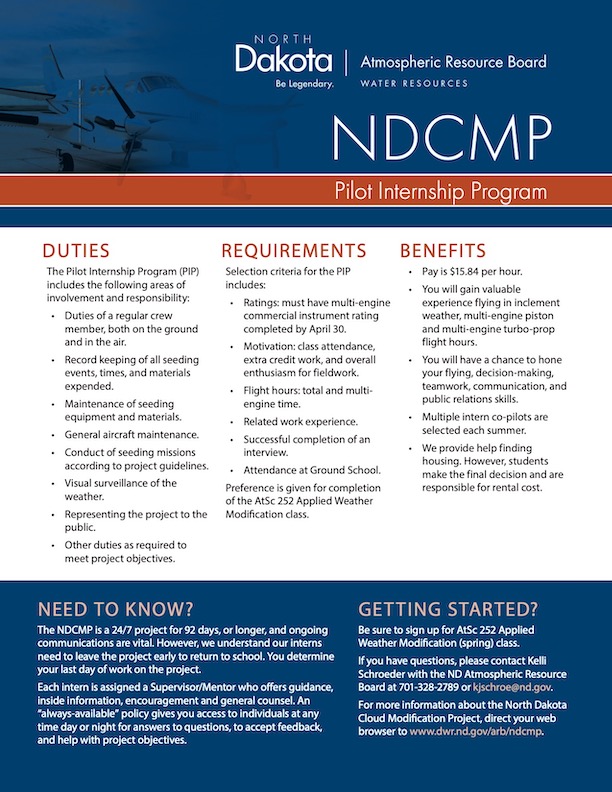Internship Programs
The Department of Water Resources (DWR) administers two internship programs during the North Dakota Cloud Modification Project (NDCMP). The Pilot Internship Program (PIP) and the Meteorology Internship Program (MIP) are designed to prepare qualified students for a professional career through participation in a summer intern position with the DWR during the North Dakota Cloud Modification Project (NDCMP).
The DWR in cooperation with the University of North Dakota’s John D. Odegard School of Aerospace Sciences (UND) (external site) have long recognized their shared roles in providing appropriate experience for students and young professionals. Each NDCMP season, a couple qualified student pilots work as interns on a full-time basis from Bowman, North Dakota. The DWR internships are an important milestone for the students, enabling them to gain unique insight and experience and to have important responsibility directly in their field of interest. The DWR constantly seeks to improve its training process and the entire internship experience. The knowledge and skills acquired by the students enhance the development and stature of an emerging workforce.
History
The Pilot Internship Program (PIP) began in 1974 with a $274,000 grant from the National Science Foundation to the University of North Dakota for an "experimental project for training pilots in weather modification". The program was instantly successful, enrolling 70 students through the fall semester of 1976. That year, the ND Weather Modification Board (now DWR) entered into a contract with UND to employ 14 interns on its summer cloud seeding program. By the mid-1980’s, the Bureau of Reclamation ceased to fund the program. Funding continued for the program until 2003, when it was no longer available. The program continued however by making internships available on a volunteer basis. Funding was restored for the program during the 2005 Legislative Assembly.
A Memorandum of Understanding between DWR and UND outlines the responsibilities of both entities to create an opportunity to prepare students for a professional career through participation in a summer intern position. Specific criteria are required to be eligible for the PIP. At the completion of the 2025 program, the program has provided training and experience for 414 pilots.
The NDCMP Meteorology Internship Program began in 1996 and to date has provided hands-on radar, operations and forecasting experience for 76 meteorology undergraduates and graduates.
Duties
The PIP includes the following areas of involvement and responsibility:
- Duties of a regular crew member, both on the ground and in the air.
- Record keeping of all seeding events, times, and materials expended.
- Maintenance of seeding equipment and materials.
- General aircraft maintenance.
- Conduct of seeding missions according to project guidelines.
- Visual surveillance of the weather.
- Representing the project to the public.
- Other duties as required to meet project objectives.
The MIP includes the following areas of involvement and responsibility:
- Assist radar meteorologists in the direction of cloud seeding operations from the radar field office located in Bowman, ND, and prepare daily convective forecasts.
- Operation of a dual-polarization doppler weather radar equipped with IRIS and TITAN software.
- Direction of seeding aircraft.
- Use of two-way radio.
- Use of data recording software.
- Making daily convective forecasts.
Requirements
Candidates for the MIP must be at least an undergraduate pursuing a degree in meteorology or atmospheric sciences. Applicants must apply and are scored and rated for selection by DWR.
Candidates for the PIP must be at least an undergraduate pursuing an aviation-related degree at UND. Applicants must apply and are scored and rated for selection by DWR and UND.
Selection criteria for the PIP includes:
- Ratings: Students must have their multi-engine rating by April 30th, prior to the start of the internship.
- Motivation: class attendance, extra credit work, and overall enthusiasm for fieldwork.
- GPA: Complete UND's AtSc 252 Applied Weather Modification course.
- Flight hours: total and multiengine time.
- Related work experience.

